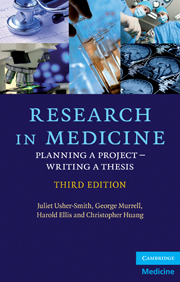Book contents
- Frontmatter
- Contents
- Preface
- 1 Introduction
- 2 Deciding whether to do research
- 3 Deciding when to do research
- 4 Selecting a research degree
- 5 Choosing a department, research supervisor and project
- 6 Applying for research positions and funding
- 7 Getting started
- 8 Overcoming frustration
- 9 Writing scientifically
- 10 Publishing a paper
- 11 Attending scientific meetings
- 12 Writing a thesis
- 13 Submitting a thesis and preparing for the viva voce examination
- Further reading
- Appendix: Information for research students wishing to study overseas
- Index
8 - Overcoming frustration
Published online by Cambridge University Press: 05 May 2010
- Frontmatter
- Contents
- Preface
- 1 Introduction
- 2 Deciding whether to do research
- 3 Deciding when to do research
- 4 Selecting a research degree
- 5 Choosing a department, research supervisor and project
- 6 Applying for research positions and funding
- 7 Getting started
- 8 Overcoming frustration
- 9 Writing scientifically
- 10 Publishing a paper
- 11 Attending scientific meetings
- 12 Writing a thesis
- 13 Submitting a thesis and preparing for the viva voce examination
- Further reading
- Appendix: Information for research students wishing to study overseas
- Index
Summary
Inevitably the heady days of early successes, new techniques and new equipment come to a resounding end when the inherent weakness of the procedure, equipment, hypothesis, approach, or even the problem you have set yourself become manifest. Setbacks and failures in research are inevitable. Being aware of this, and realistic about it, will help you to cope. It is important not to take such events too seriously, but to treat them in an analytical, almost detached fashion, as yet further problems to solve.
In addition, it is important to be clear that not obtaining positive results, or the findings that you expected, need not invariably be identified with failure. Disproving a particular point conclusively can be as constructive and scientific an outcome as proving a hypothesis. Initial negative results may provide a warning about the appropriateness or validity of the hypothesis being explored. However, it is genuinely disheartening when experiments do not seem to work at all and fail to give any interpretable results. Individuals vary a great deal in the way they react to such obstacles. Here are some alternatives, whose applicability would vary with the particular situation at hand.
Repeat the same procedure
Do this when you think the procedure you have adopted is fun- o damentally sound, but that you may have performed it with less skill than you might have wished, or feel you require further practice in performing the procedure itself.
This course of action is desirable provided that you re-examine o the situation and assess the problem before you repeat.
[…]
- Type
- Chapter
- Information
- Research in MedicinePlanning a Project – Writing a Thesis, pp. 71 - 74Publisher: Cambridge University PressPrint publication year: 2010



